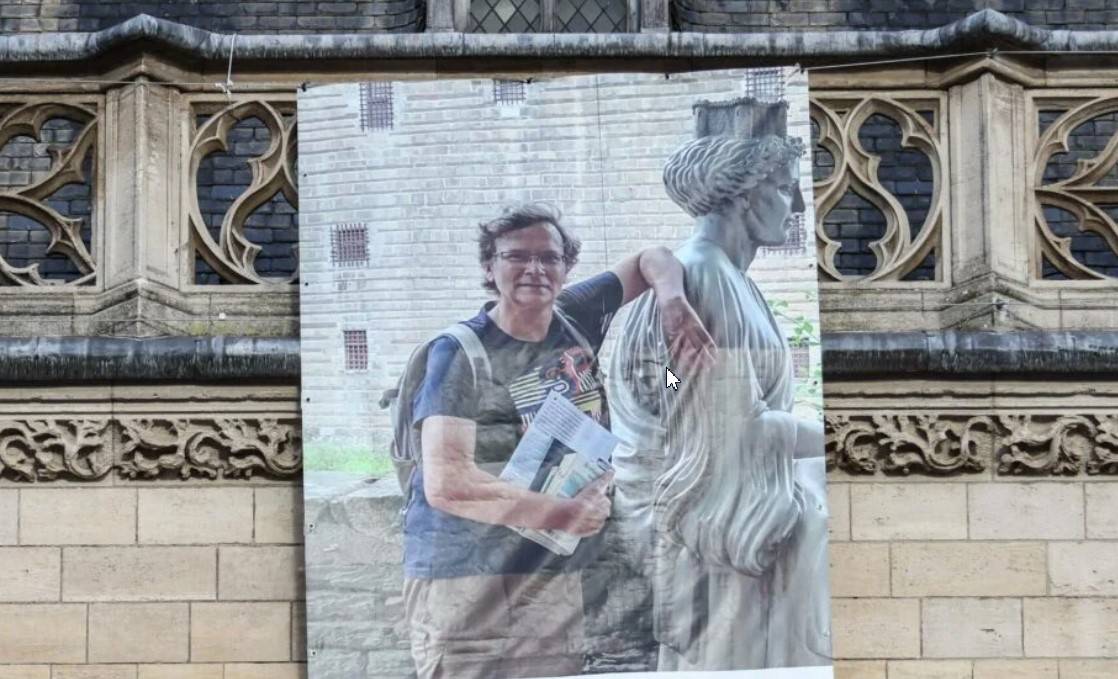Defending the Republic: The ongoing struggle to protect French teachers
Defending the Republic: The ongoing struggle to protect French teachers
In the face of Islamic terrorism, France’s commitment to education based on the Republic’s core values remains unyielding

A picture of French teacher Dominique Bernard is seen on the town hall, in Place des Heros, in Arras, the teacher was stabbed to death by an Islamic terrorist, at Gambetta high school in Arras on 13 October. Photo: AAP/Mohammed Badra
In France last week, a schoolteacher was assassinated for a second time in the town of Arras, near the Belgian border. Dominique Bernard was his name and he was a history and geography teacher.
A father of three girls, he dedicated his life to teaching values and education to young French people, much like Emmanuel Patty, another history and geography teacher who was beheaded three years ago Samuel Paty (portrait) near the Bois d’Aulne school in Conflans-Sainte-Honorine, outside Paris, Samuel Paty, for showing Mohammed cartoons during lessons on freedom of expression.
It was no coincidence that both became targets because they were teachers.
For better or worse, the French school system – which has historically also been harshly criticised – has emerged as the central tenet of the French Republic since the French Revolution of 1789. French national identity was founded on liberty, equality, and fraternity.
That Republic was primarily shaped by the teachers, known as the Republic’s black hussars given a name to a tough military unit in the Napoleonic Wars. Combined with the idea of living together, to which French people have a strong attachment.
French schooling and the continued promotion of secular democratic values, could explain why the primary goal of Islamic terrorists is to stamp out teachers – a critical strategic decision, for now, and long term.
Ultimately, the French educational system influences young people’s worldviews, values, and personalities in one way or another, directing them towards modernity, tolerance, and high tech in a globalised world.

However, it seems that French society has grown used to dealing with Islamic terrorism in the meantime. But determination instead of fear is what I see, the French have always impressed me with their calm, especially in the face of difficulties during the past 20 years.
Remember that individuals’ basic principles and ways of living will never change because they are glad about that and will keep standing up for them.
From another angle, what occurred in France was somewhat foreseeable. The question now is not whether but when and where there will be the next Islamic terrorist strike, which is inevitable. Purchasing a knife doesn’t need much thought or effort.
This is far simpler than trying to obtain a gun in a nation like that, where the legal system is extremely harsh. But regrettably, a knife makes a terrorist almost invisible, especially in busy urban locations, where it is exceedingly difficult to stop. These low-tech processes have evolved into a problematic maze for the public authorities.
Still, the main question is how voting behaviour will evolve. Whether the attacks by Islamic terrorists will significantly impact the 2027 presidential election or not.
When Emmanuel Macron’s second term ends, a ten-year cycle in French politics will end. As was previously the case with François Mitterrand’s and Jacques Chirac’s dual mandates. Who will take his place in Paris’s Élysée Palace?
French President Emmanuel Macron will have much on his plate by the end of his second mandate in four years. This is the reason behind his current Middle East travel.
Dr George Tassiopoulos is a Greek French political scientist, with a doctorate in political science from the University of East Paris. He was born in Athens, and has lived in France for the past 22 years where he teaches geopolitics in a business school in Paris.


